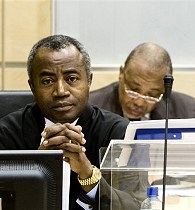Dakar
13 July 2009
The trial of Charles Taylor has resumed today in The Hague, where the former president of Liberia is charged with war crimes in neighboring Sierra Leone.
 |
| Former Liberian President Charles Taylor, right, and his defence lawyer Courtenay Griffits, at the Special Court for Sierra Leone in The Hague, Netherlands, 13 Jul 2009 |
"We are here to defend a man who we say is innocent of these charges," sadi Griffiths.
During Sierra Leone's civil war, the Revolutionary United Front was notorious for hacking off the limbs of civilians with machetes.
Taylor is also charged with the murder, mutilation, rape and enslavement of civilians, and the recruitment and use of child soldiers.
Taylor is not known to have ever been to Sierra Leone, but he is charged as being part of a joint criminal enterprise, a form of liability that places blame on the architects of certain crimes. The Special Court for Sierra Leone is holding the trial in The Hague in order not to upset the peace process in Sierra Leone.
In May, defense lawyers have said Taylor should be acquitted because there was no evidence he planned or instigated atrocities in Sierra Leone, but judges rejected that last month.
"It must equally be recognized that this case has been played out over at least six years by the prosecution in the court of public opinion worldwide," added Griffiths.
The defense team says it will call 256 witnesses, three times more than those called by the prosecution. A time period of about four years would be needed to hear such a high number of testimonies, but it is likely that only a fraction of those called will actually appear in court.
The defense is expected to claim that some of the testimonies heard by the prosecution were unnecessary and irrelevant. It will also question the stipends, expenses and in some cases, compensation, paid to prosecution witnesses.
Observers say Taylor is taking the trial very seriously and has attended almost every session since it opened in January 2008. Tomorrow he will take to the stand and give evidence in his defense.